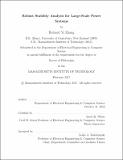| dc.contributor.advisor | Jacob K. White. | en_US |
| dc.contributor.author | Zhang, Richard Yi | en_US |
| dc.contributor.other | Massachusetts Institute of Technology. Department of Electrical Engineering and Computer Science. | en_US |
| dc.date.accessioned | 2017-05-11T19:06:37Z | |
| dc.date.available | 2017-05-11T19:06:37Z | |
| dc.date.copyright | 2017 | en_US |
| dc.date.issued | 2017 | en_US |
| dc.identifier.uri | http://hdl.handle.net/1721.1/108846 | |
| dc.description | Thesis: Ph. D., Massachusetts Institute of Technology, Department of Electrical Engineering and Computer Science, 2017. | en_US |
| dc.description | This electronic version was submitted by the student author. The certified thesis is available in the Institute Archives and Special Collections. | en_US |
| dc.description | Cataloged from student-submitted PDF version of thesis. | en_US |
| dc.description | Includes bibliographical references (pages 145-154). | en_US |
| dc.description.abstract | Innovations in electric power systems, such as renewable energy, demand-side participation, and electric vehicles, are all expected to increase variability and uncertainty, making stability verification more challenging. This thesis extends the technique of robust stability analysis to large-scale electric power systems under uncertainty. In the first part of this thesis, we examine the use of the technique to solve real problems faced by grid operators. We present two case studies: small-signal stability for distributed renewables on the IEEE 118-bus test system, and large-signal stability for a microgrid system. In each case study, we show that robust stability analysis can be used to compute stability margins for entire collections of uncertain scenarios. In the second part of this thesis, we develop scalable algorithms to solve robust stability analysis problems on large-scale power systems. We use preconditioned iterative methods to solve the Newton direction computation in the interior-point method, in order to avoid the O(n6) time complexity associated with a dense-matrix approach. The per-iteration costs of the iterative methods are reduced to O(n3) through a hierarchical block-diagonal-plus-low-rank structure in the data matrices. We provide evidence that the methods converge to an [epsilon]-accurate solution in O(1=[square root of ] [epsilon]) iterations, and characterize two broad classes of problems for which the enhanced convergence is guaranteed. | en_US |
| dc.description.statementofresponsibility | by Richard Yi Zhang. | en_US |
| dc.format.extent | 154 pages | en_US |
| dc.language.iso | eng | en_US |
| dc.publisher | Massachusetts Institute of Technology | en_US |
| dc.rights | MIT theses are protected by copyright. They may be viewed, downloaded, or printed from this source but further reproduction or distribution in any format is prohibited without written permission. | en_US |
| dc.rights.uri | http://dspace.mit.edu/handle/1721.1/7582 | en_US |
| dc.subject | Electrical Engineering and Computer Science. | en_US |
| dc.title | Robust stability analysis for large-scale power systems | en_US |
| dc.type | Thesis | en_US |
| dc.description.degree | Ph. D. | en_US |
| dc.contributor.department | Massachusetts Institute of Technology. Department of Electrical Engineering and Computer Science | |
| dc.identifier.oclc | 986521891 | en_US |
